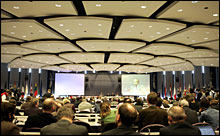from the April 6, 2007 edition
 |
|
Latest global warming report urges world to begin adapting
The poor may be hit the hardest by climate changes, IPCC report says; calls for stronger action
By Peter N. Spotts | Staff writer of The Christian Science Monitor
Global warming is having a measurable effect on Earth's climate, including agriculture, freshwater resources, and plants and animals on both sea and land. These changes are expected to intensify as temperatures continue to rise.
Those are among the conclusions of a new report from the Intergovernmental Panel on Climate Change (IPCC), a UN-sponsored group of scientists. A summary of their findings released April 6 outlines climate changes and how researchers expect them to play out as warming continues. Their impact on society, the IPCC report says, will vary depending on the amount of actual temperature increase that occurs and humanity's capacity or ability to adapt to the changes.
"Not all of these effects are negative," notes Sharon Hayes, an official with the White House Office of Science and Technology Policy, who headed the US delegation to the week-long meeting in Brussels where scientists and political delegations hammered out the summary's final wording. At least during the early part of the century, for example, crop yields in wetter parts of the mid- and high latitudes, including regions of Russia, Canada, and the US, are expected to rise.
But the report also makes clear that as temperatures rise, negative effects increase, Dr. Hayes adds. And the poorest countries, which contribute the least to global warming, are expected to face the biggest challenges in coping with it.
The report unleashed an immediate chorus of calls for the US to adopt a climate policy that includes mandatory controls on green-house gas emissions. John Connaughton, who heads White House Council on Environmental Quality, told reporters during a briefing April 6 that the Bush administration is pushing two programs that will accomplish the same end: a commitment to higher auto mileage standards and to replacing 20 percent of gasoline consumption with biofuels in the next decade.
But for many observers, that's not enough. Noting that the IPCC report comes on the heels of this week's US Supreme Court ruling that the Environmental Protection Agency has the authority to regulate carbon dioxide as a pollutant, Eileen Claussen, president of the Pew Center on Global Climate Change, said in a statement, "We need a mandatory climate policy in the United States" – one that, among other things, would directly control CO2 emissions.
A broad range of ways to adapt are available, the IPCC report says. But too little is being done to prepare for the disruptive effects a warmer world is expected produce. Most of the attention so far has focused on efforts to curtail emissions of heat-trapping greenhouse gases, especially carbon dioxide, produced by human activity, such as emissions from coal-fired power plants. But the report notes that more emphasis must be placed on adaptation as well.
Efforts to encourage sustainable development can help countries improve their resilience. But the report notes that over the next 50 years, the regional effects of global warming could undermine efforts to achieve those development goals.